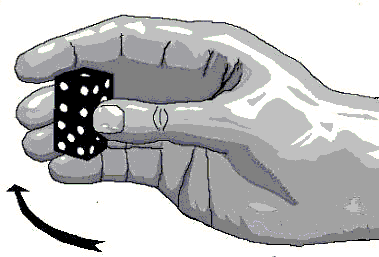After the jump we have one of the dice cheats you can use if some smart-ass 10-year old is getting the better of you.
The fellow who patented the game, Charles Darrow, did not invent it, did not improve it and pretty much did nothing but file for the patent, which the USPTO granted; Patent Number 2,026,082 on December 31, 1935.
We've looked at Henry George a few times, links after the jump.
First up, from BT.com:
December 31, 1935: Charles Darrow patents the board game Monopoly
A salesman granted himself a licence to print money when he patented the World's most popular board game on this day in 1935.
The most successful board game of all time, Monopoly - which would go on to be printed in more than 40 languages and licensed in well over 100 countries – was patented on this day in 1935 by a salesman from Philadelphia named Charles B. Darrow.
After convincing the Parker Brothers company to publish the game, its ongoing success would make Darrow the first ever millionaire game designer. It would later be established, however, that Monopoly was simply a development of other, previously existing board games which dated back to the turn of the century.
In 1903, an anti-monopolist named Elizabeth ‘Lizzie’ Magie had created what she called The Landlord’s Game, intended to show the negative aspects of allowing too much land to be held by private monopolies. She took out her own patent a year later.
In 1903, an anti-monopolist named Elizabeth ‘Lizzie’ Magie had created what she called The Landlord’s Game, intended to show the negative aspects of allowing too much land to be held by private monopolies. She took out her own patent a year later....MORE (Internet Archive, link rotted)
BT knows a thing or two about monopolies, past and present.
And From Henry George.org:
How Henry George's Principles Were Corrupted Into the Game Called Monopoly
...MUCH MOREHistory is filled with surprising stories of how people and ideas are connected. One such story is that of the origins of the most popular board game in modern history. It's an American classic: each new generation of Monopoly players learns to love (harmlessly) indulging its cutthroat, ruthless, greedy impulses. Players begin the game as equals. Luck — and a bit of strategy — eventually enables one player to dominate all others. That player ends up amassing a huge fortune in cash and real estate. Most Monopoly players don't know (or care) that this game was originally the product of a passion for social and economic justice. In the late 1800s, a young woman named Elizabeth Magie was introduced to the writings of Henry George by her father. She eventually became one of many people who took on the task of trying to teach others what she had learned from studying Progress and Poverty and George's other works.
Collaborating with friends in her Brentwood, Maryland community, Elizabeth Magie created The Landlord's Game. She applied for a patent, which was granted on January 5th, 1904 (No. 748,626). She explained that the game was to be a "practical demonstration of the present system of land-grabbing with all its usual outcomes and consequences."
While still a young, single woman, Elizabeth -- or "Lizzie" as she came to be called -- became a regular visitor to the Single Tax enclave of Arden, Delaware. This was around 1903. Whether on her own or in conjunction with other Single Taxers in Arden, Lizzie continued to work on the design of The Landlord's Game as a way to explain how Henry George's system of political economy would work in real life.
Arden landmarks: Stephen's Theater and the Craft Shop.
For a close-up look at the game board used in Arden, Click here.The First Commercial Versions of The Landlord's Game
In 1906, Elizabeth moved to Chicago, Illinois, where she met, and in 1910 married, Albert Phillips. I have not been able to find any reference to Albert as a follower of Henry George, but evidently he was sympathetic to his wife's efforts. At some point in 1906 Elizabeth and a number of other followers of Henry George established the Economic Game Company of New York, which published The Landlord's Game.
Sometime soon thereafter Elizabeth and Albert moved to Clarendon, Virginia, in the Washington D.C area and eventually patented a new edition of The Landlord's Game in 1924 (No. 1,509,312) under her married name of Elizabeth Magie Phillips. This new edition, published by the Washington, D.C. firm, Adgame Company, appeared in 1932 and included named streets and other changes in the appearance of the board. More importantly, the new edition included a second, alternative, set of rules and a second name for the game, Prosperity.


Connections with Academe
Around 1900, Scott Nearing was introduced to The Landlord's Game by either Lizzie Magie or other residents of Arden. He was at the time a full-time resident of Arden. Nearing went on to become a member of the economics department at the University of Pennsylvania in 1906, where he used The Landlord's Game in his teaching. His support of Henry George's proposals to raise pubic revenue exclusively from those who owned land, and his opposition to child labor, caused him to be dismissed from the university in 1915.
Burton H. Wolfe, in "The Monopolization of Monopoly" (San Francisco Bay Guardian, 1976), says that "Nearing played The Landlord's Game with his brother, Guy Nearing, who lived in the Henry George single tax community of Arden, Delaware." Then:
As the students and single taxers played the game, they began a process ... of altering the rules. The main change was that instead of merely paying rent when landing on a property block, the players could hold an auction to buy it. They also made their own game boards so that they could replace the properties designated by Lizzie Maggie with properties in their own cities and states; this made playing more realistic. As they drew or painted their own boards, usually on linen or oil cloth, they change the title "Landlord's Game" to "Auction Monopoly" and then just "Monopoly".Burton Wolfe also tells us that a young Rexford E. Tugwell was one of the players. One of Tugwell's own students, Priscilla Robertson -- long-time editor of The Humanist -- provided the following details on the early history of the game: "In those days those who wanted copies of the board for Monopoly took a piece of linen cloth and copied it in crayon. It was considered a point of honor not to sell it to a commercial manufacturer, since it had been worked out by a group of single taxers who were anxious to defeat the capitalist system." (I am obliged to note here the considerable misrepresentation of the objectives pursued by Single Taxers who shared Henry George's principles. Defeating monopoly in all its forms (but, particularly, monopoly of nature), not capitalism, was - and is - the cause embraced then and today.)
Other writers note the game was played by students at Princeton University and Haverford College. Changes were made to the board design, gathering the properties into groups, allowing buildings to be added to the locations and increasing the amount of rent charged based on the number of like properties owned.
By the late 1920s, the version of the game being played by college students and others had evolved quite a bit from Elizabeth's design. The game was now generally referred to as "Monopoly." A young student at Williams College (Reading, Pennsylvania) produced a commercial version under the name Finance, but the game was essentially Monopoly. Then, a woman named Ruth Hoskins who learned the game in Indianapolis moved to Atlantic City, New Jersey and supposedly created the version that included the Atlantic City street names.
Then the plot thickens. The game was introduced by Eugene (Colonel) and Ruth Raiford, friends of Ruth Hoskins, to Charles Todd, who lived in Germantown, Pennsylvania; and, Charles Todd then introduced the game to Charles and Esther Darrow. Eugene Raiford, Charles Todd and Esther Jones Darrow all attended the Quaker Westtown School from 1911 to 1914 or 1915. The subsequent connection with Atlantic City occurred because of the close association of the Westtown School with the Atlantic City Friends' School. As Todd later recalled: "The first people we taught it to after learning it ... was Darrow and his wife Esther. ...It was entirely new to them.... Darrow asked me if I would write up the rules and regulations and I wrote them up ... and gave them to Darrow."...
And Henry George?
...In a January 1936 interview in The Washington Star, Elizabeth was asked "how she felt about getting only $500 for her patent and no royalties ever. She replied that it was all right with her "if she never made a dime so long as the Henry George single tax idea was spread to the people of the country."...If interested see also:
- "Monopoly is Theft: The antimonopolist history of the world’s most popular board game"
- "How Land Disappeared from Economic Theory"
- The Real Real Estate State and Artificial Scarcity, Technology and Planning
And cheating at dice, "The Whip Shot - Dice Control":
One of the cheat's moves to determine and control the outcome of a throw of two dice is known as the Whip Shot. Learn how cheats can guarantee what numbers are thrown.
Also known as the Peek Shot, the Pique Shot, the Drop Shot and the Hudson Shot. This shot takes more skill than the simple Blanket Roll, but a cheat will make great effort to learn this shot because he can control with certainty the numbers thrown. It doesn't merely change the odds like the Blanket Roll, it sets the result as almost certain with the right conditions.
The cheat will pick the dice up and hold them in a Lock Grip with the desired numbers on the dice facing upward. They are given a false rattle, then the cheat rolls the dice forward with his thumb towards his fingertips (as shown in the diagram).
The cheat then snaps out his wrist with the motion of snapping a whip and throws the dice, but so that the dice spin rapidly like spinning tops without turning along the horizontal axis. The dice then land with the desired faces facing up. To prevent the dice bouncing on a hard surface, the cheat may sprinkle salt or sand on the throwing area, so they slide, or generally soften the surface where the dice are thrown.
A variation and extension to the Whip Shot when throwing against a backboard is the Greek Shot.
Using the same hold you can perform the drop shot, which as the names says is the technique of dropping the two dies such that the upper die freezes the lower die in the position you've chosen, say a six. The upper die will roll away but what you have accomplished is to guarantee a minimum score of 7 (6+1) while additionally increasing the odds of a double 6 from 1:36 to 1:6.
It is strongly suggested that you not use these techniques in high-stakes backgammon games.
One last point:

Page 2 of the two page vintage instructions PDF:
https://www.hasbro.com/common/instruct/Monopoly_Vintage.pdf




